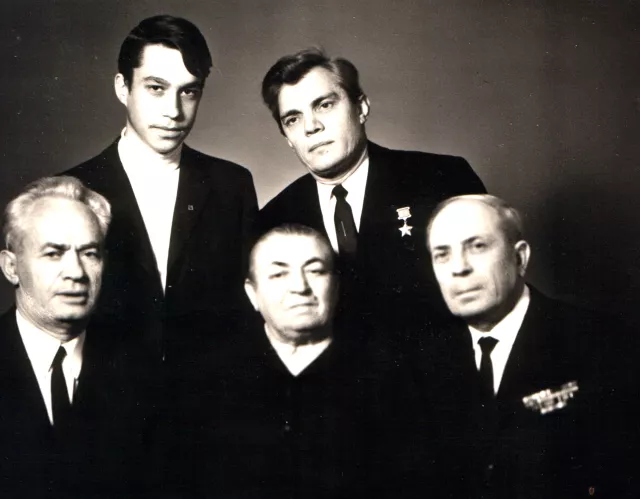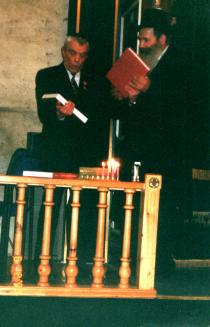Moisey Marianovskiy with his friends and relatives
This photo was taken in Tashkent in 1970 where I went to the 70th birthday of Abram Leihtman, my older sister Emilia's husband. Upper row: Efroim Leihtman, my nephew and the son of Emilia and Abram Leihtmans, and I, Moisey Marianovskiy. Lower row in the center: Abram Leihtman, my older sister Emilia's husband, and his friends on his right and left, unfortunately, I do not know their names.
In 1946 I entered Moscow State University named after Lomonosov, the Faculty of History. I was a lecturer at the department 'History of the CPSU'. I worked there for 35 years. I still keep in touch with the college and my former students. They visit me at home. There was only one reason why I enjoyed my work. I invited my comrades, who marched the paths of the war. My students wrote reports about the war. I emphasized the war events in the history of the CPSU. I stepped aside from this policy and though my subject was History of the CPSU, I did not care. I knew but too well what kind of history this was. I resigned in 1991.
I met my wife Valentina Kisliakova at the Likhachev plant before the war. She also worked there. She waited for me through the war. We waited for one another. Valentina was a good person. We got married in 1946. Our first daughter Yelena was born in 1947. My wife came from a Russian family. She worked as an accountant at the plant. In 1956 our second daughter Olga was born. We were a loving family. My wife and I raised our beautiful daughters to become honest, hardworking and kind people. I was not religious and did not teach my daughters any Jewish traditions. Lena and Olia know they are Jews. My wounds had an impact on my health. I was ill for a long time after the war. My wife took care of me. I owe her my life. My wounds remind me of my health condition. My wife and I went to recreation homes and she forced me to keep a diet. I survived thanks to her care. Valentina created the atmosphere of love and respect in our family. It stayed with us after my wife died. My daughter Olia takes care about me now. She is doing it with the same dedication as my wife did. The happy life of our family came to an end, when our beautiful daughter Lenochka died in 1962. She was just 25 years old. She had brain tumor. Our daughter’s death was a hard blow for my wife. She developed cancer and died prematurely in 1976. Olia finished the Law College. She works as a lawyer. She takes care of me and helps me with my pub. She has a son. He is my grandson. His name is Ivan Barashev. Vania studies in the College of foreign languages. Olia’s husband Alexandr Barashev is Russian. He is director of a small polygraphist enterprise.
My older sister Emilia Marianovskaya was born in 1903. We called her Milia at home. Emilia finished a gymnasium. She married Abram Leichtmann, a Jewish man from Moscow, and adopted his last name. Her husband was fond of revolutionary ideas. My sister had a son named Efroim. My sister was a well-read and intelligent woman. Milia also got fond of revolutionary ideas. Her party leadership sent her to Uzbekistan in the late 1930's. Emilia and her family lived in Tashkent [about 2900 km southeast of Moscow]. She worked in trade unions. She started her career at a plant and was gradually promoted to the republican level. She worked hard to take care of common people's problems, trying to improve their living conditions. She also initiated construction of health care centers and rest homes. Though we lived at quite a distance from one another my sister and I had very warm and close relationships. I visited her in Tashkent in 1970 when I went to the birthday anniversary of her husband Abram. Emilia died in 1985. She was buried in the town cemetery in Tashkent. Her son and grandchildren live in Tashkent now.



















